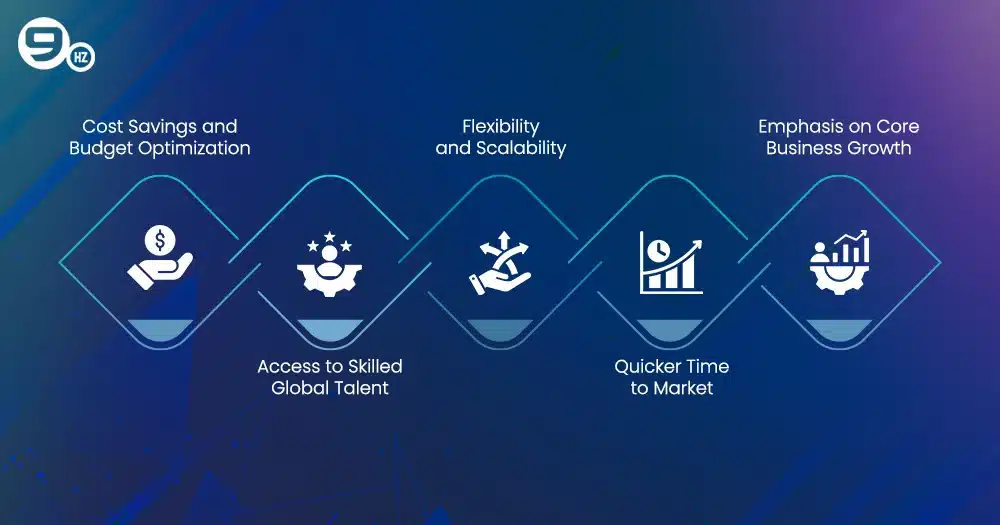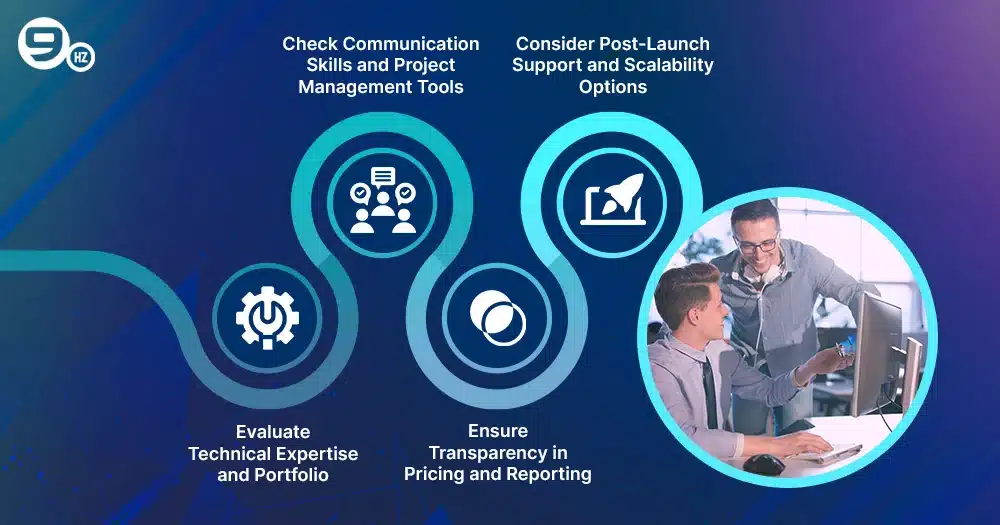Offshore website development is engulfing the global tech ecosystem – fast! Organizations are partnering with offshore developers in Eastern Europe, Southeast Asia, and India to develop, manage, and optimize their websites at a fraction of the local development costs.
It’s 2026, and website project demands are changing more than ever! Both competition and the need for quicker delivery are mounting. To stay infallible against such pressure, businesses are choosing the offshore web development process. It’s fast, affordable, and brings quicker access to the right talent globally.
No doubt, offshore website development is spearheading a global shift. Just look at these stats –
- 72% of US SMEs plan to increase offshore web development usage by 2026. (Gartner, 2024)
- Businesses are saving up to 63% by choosing offshore professionals over onshore teams. (Statista, 2026)
- Offshoring cuts project turnaround times by 35%, thus speeding up digital delivery. (Statista, 2026)
So, are you all set to hire offshore web developers? Before you take the plunge, check out our guide to learn –
- What offshore development is and exactly how it works
- Key benefits in 2026 – speed, talent, and cost efficiency
- Regional cost breakdowns
- How to pick the right partner and conquer common challenges
Let’s dive in!
What is Offshore Website Development?
To put it simply, when you hire offshore partners, you let a specialized offshore website development company in another country or continent create your site. From ideation to design to development and ongoing support, they take care of every task involved in the process. These tasks include UI/UX design, CMS integration, coding, e-commerce development, and more!
How Offshore Web Development Different from Onshore & Nearshore Development?
Let’s find out what set all of them apart –
- Onshore Development: It’s when you partner with a local team in your own country. Like a US-based business hires a web agency in New York.
- Nearshore Development: When you collab with a web development team in any bordering country or nearby time zone. For example, an agency in the US is working with a Mexico-based company.
- Offshore Development: It’s when you hire an offshore web team in a distant location to explore new talent globally or reduce costs. Some of the popular destinations are India, Vietnam, and Ukraine. Also read offshore vs nearshore for better understanding.
Build Your Website with Global-Grade Talent
Key Services Provided by Offshore Web Development Solutions
A reputable offshore web development company aims to cover all the major aspects of building and optimizing a modern website. Such include the followings –
- UI/UX Design: The creation of user-centric and conversion-optimized layouts
- Custom Website Development: Everything, including dynamic web apps and static sites
- CMS Integration: Drupal, Joomla, Shopify, WordPress, and more
- E-commerce Development: A complete store setup, inventory systems, and payment integration
These apart, front-end & back-end development, API integration, ongoing support, and continuous maintenance are also included.
Pro Tip: You should always collab with an offshore partner that has years of experience. To be sure of their credibility, check their portfolio. This applies no matter if you need a software team, web developers, or mobile app experts.
Why Businesses are Choosing Offshore Development in 2026
Offshore website development continues to flourish and is expected to take over the globe in 2026 or beyond. So, what’s garnering more and more interest globally? Let’s find out what’s fueling this trend –
- Huge Savings: Companies can save up to 60% on development costs by getting their websites built by offshore developers. This doesn’t affect the quality. Project costs are cheaper since living costs are lower in Asia and Eastern Europe.
- Access to Global Talent: If you need support with React, Angular, or Python, the right partner will provide you access to skills that aren’t simple to locate in your country.
- Easy to Scale: You can add additional members quickly when you need them for big launches or scale down when business is slow. And you won’t have to worry about payroll costs for a long time.
- Faster Project Delivery: Companies work on projects all day and night across time zones, which means they finish them faster and keep moving forward.
- Focus on Core Business: Focus on Core Business: Your in-house team may work on marketing, strategy, and customer service while offshore developers resolve technical problems.
According to a Gartner survey from 2026, 70% of US tech CEOs claimed that “access to specialized skills and speed to market” – not just cost savings – are the main reasons companies are leaning toward offshore web development.
Top Benefits of Offshore Website Development
Offshore website development signals a potential surge in 2026. This popularity will continue to rise with the years to come. Here are some of the compelling perks of hiring offshore web developers –
1. Cost Savings and Budget Optimization
The list is incomplete without mentioning cost efficiency, which is the top perk of offshore website development. Every dollar matters, especially in today’s economic scenario.
- Lower operational costs and hourly rates: The offshore development teams based in Eastern Europe, Southeast Asia, or India provide skilled developers at a fraction of the rates charged by Western Europe, the US or UK. It helps businesses save up to 60–70% on development costs! If you’re into a startup or a budding enterprise alike, you can get financial feasibility to manage your complex projects.
- Reduced need for in-house teams:It’s often a cumbersome task to hire, recruit, or manage an in-house team! You can avoid this hassle by simply choosing an offshore web development company. There’s no need for additional workspaces, software or hardware licensing. This automatically translates to significant savings.
Quick Fact: A US company can hire a qualified offshore web developer for $30 to $50 an hour, which is less than half of what it would cost to hire experts with the same talent in San Francisco or London.
Pro Tip: Take “all-in” costs into serious account. Offshore partners often include project management, quality assurance, and tech support in their services. Having an in-house team could cost a bit more due to HR, office space, and other things!
2. Access to Skilled Global Talent
Imagine a door opening to a huge global talent pool for your next web project. It could change the game by bringing you innovation and technical superiority.
- Specialized experts across technologies: No matter if you need specialized skills in WordPress, Shopify, Magento, React, Angular, or any niche web app frameworks, you can easily get the top-skilled developers when you partner with a reputed offshore web development company. With cutting-edge technologies, tools, and trends, they can meet all your needs!
- Quality coding and on-time delivery: Expect security, reliability, and quality from the best offshore web development services. The offshore experts are accustomed to global standards. Plus, offshore development teams are experienced working with clients of different needs. Their expertise helps them maintain timely project delivery without compromising quality.
Stat: As per the Global Talent Report by Clutch’s 2026 report, almost 85% of businesses found offshore developers far more efficient than the local hires!
Get Custom Website Development Without the Overhead
3. Flexibility and Scalability
The digital landscape is constantly evolving. To stay ahead of the volatility, you must be able to adapt. With offshore website development, you gain that edge!
- Scale up or down with ease: When your project scope changes, you can add more developers or even downsize without getting into the hassle of hiring or laying off. Those with fluctuating project demands can benefit hugely from this.
- Long-term or short-term engagement: You get optimum flexibility from offshore partners. With offshore solutions, you can meet your specific needs, no matter if you need a fully dedicated team for a big project or just some additional support for a single sprint.
Pro Tip – A fully dedicated offshore development team works just like your own. They can adapt to your needs fast and deliver results consistently.
4. Quicker Time to Market
In today’s competitive age, speed is an edge! Offshore web development supercharges speed.
- 24×7 development cycles because of time zone differences: Your web projects continue 24×7 when you collab with a team from a different corner of the globe. Progress continues while you sleep! This fast-tracks the web development process to a great extent.
- Agile collaboration and continuous progress: The top offshore web development services use top-tier digital tools like Trello, Asana, Jira or Slack. This guarantees smooth communication, transparent monitoring, and real-time updates. It keeps delays at bay besides streamlining coordination across global teams.
5. Emphasis on Core Business Growth
Your team can fully focus on your core business strategy when you hire an offshore web development team.
- Shift the focus to marketing and growth: Let your offshore development partners manage technical optimization or build. While your in-house experts can do other things like marketing, customer management, sales, etc. Ease and efficiency rolled into one!
- Outsource tech complexities to the right experts: It’s not easy to choose the right tech stack, integrate APIs, or troubleshoot. The offshore development teams can do this heavy-lifting. Meanwhile, you can focus on scaling your business without any distractions!
Smart, Scalable & Affordable Web Solutions
Offshore Website Development Cost in 2026
Average Hourly Rates by Region
A major perk of offshore website development is cost savings! Keen to learn how it may look in real numbers, especially in 2026? Check out the average hourly rates by region and budget your upcoming project with clarity.
| Region | Average Hourly Rate (USD) | Example Countries |
|---|---|---|
| North America | $80 – $150 | USA, Canada |
| Western Europe | $60 – $120 | UK, Germany, France |
| Eastern Europe | $30 – $60 | Ukraine, Poland, Romania |
| Asia | $20 – $50 | India, Vietnam, Philippines |
Pro Tip: When you compare offshore web development costs, don’t just check out the hourly rates. Rather, request a full project quote, which includes planning, testing, coding, and support. The best way to gain clarity of the overall expenses.
Factors Affecting Offshore website Development Cost
Development costs are never equal for every project. Every offshore website development project comes with different needs. So, the overall costs always differ based on some of these factors.
1. Project Complexity & Technology Stack
The more complex the technology you utilize or the more complicated your web development project is, the more it will cost. You need unique frameworks and technological know-how to build truly complex things like eCommerce sites, AI/ML systems, or web apps.
You need experienced offshore development teams and good project management to generate good results on these projects.
2. Developer Experience and Seniority
Hiring highly competent offshore developers or architects will cost more. Experts who have worked in fields like security or machine learning for a long period charge more.
Offshore development teams are made up of both professional engineers and individuals who have worked in the field for a long time. They get the job done on time, and go above and beyond by checking for cultural compatibility and making sure there are no communication barriers.
3. Engagement Model
The way you work with an offshore software development company will determine costs and flexibility. Fixed price is perfect for initiatives that have clear goals. A dedicated team or a time and materials strategy works effectively for projects that evolve a lot.
Your projects won’t run over budget when you clearly define the offshore development processes and a set project scope.
4. Support and Maintenance Requirements
Costs go up because of continuous support, quality assurance, and maintenance. Some offshore web development services offer updates and fixes in their costs, while others charge separately.
Always go over what’s covered, set expectations for additional help, explain escalation steps, and make sure the relevant tools are used to avoid unexpected costs.
Save Time & Budget Without Compromising Quality
How to Choose the Right Offshore website Development Partner
Here comes the most important question: how to choose the best offshore website development company? This decision is paramount, as it can either make your project a success or a failure! Use this proven checklist to hire only the best global talent pool –
1. Evaluate Technical Expertise and Portfolio
Before hiring an offshore web development company, check if it has extensive technical expertise. Look into its work portfolio to check if it has worked on multiple successful projects.
- Review old projects: Request a list of recent web development projects, and try to find ones that are in the same field as yours or that are of similar complexity. Look for live links, reviews from customers, and visible results.
- Ask for code examples: Top offshore development teams will be happy to share with you private GitHub repositories or code samples. Through real-world results, you can get an idea of their coding standards and problem-solving skills. If you can, ask for a short test task before you commit to a bigger engagement.
2. Check Communication Skills and Project Management Tools
For offshore development to be successful, communication needs to be seamless! Developers can misunderstand or take too long because they don’t speak the language well or utilize old-fashioned approaches.
- Check their language proficiency: Connect to the team members through video calls to check their spoken and written English proficiency (or the language you want). Seamless communications help them understand project requirements, delivery milestones, etc., better.
- Assess project management: Find out what kinds of technology the offshore development teams utilizes. Do they use new, collaborative platforms like Asana, Jira, Trello, or Slack? These tools help teams working on different parts of the same project obtain real-time information, monitor their progress, and produce reports quickly.
3. Ensure Transparency in Pricing and Reporting
Don’t expect a reputable offshore web development hub to hide their processes or costs.
4. Consider Post-Launch Support and Scalability Options
Launching a website is just cursory-level work. Long-term planning is crucial for successful partnerships for offshore website development.
- Support matters: Make sure that ongoing support will still be available after the site goes live, whether it’s to fix bugs, add new features, or make security updates. Ask the team how long it may take to deal with major problems and how to move them up the chain.
- The ability to scale: As your firm grows bigger, so will your digital needs. If the project’s needs change or you need new features, ask the supplier if they can swiftly add more engineers, testers, or designers to your dedicated team.
Pro Tip: Don’t forget to check factors like time zone differences or cultural compatibility. Try to choose a provider who is familiar with your market. This keeps your website relevant for your audience.
Challenges in Offshore Development and How to Overcome Them
Offshore website development has certain setbacks. The good news is, you can turn those challenges into catalysts of growth. Here’s how!
1. Communication Barriers
- Problem: Language limitations and differences in work culture could cause misunderstandings, unclear requirements, or delays in web development process.
- Solution: Pick offshore developers who are good at English. Set up video calls on a regular basis, make sure that everyone can see clear documents, and employ solutions that help everyone work together. If you have a big project, appoint a local liaison or project manager.
2. Time Zone Differences
- Problem: Disparate working hours can make real-time collaboration difficult, slowing down decision-making or issue resolution.
- Solution: Take advantage of time zone variations by having meetings that overlap and using platforms like Jira and Slack. The best offshore development teams are always there to help you attain your most important goals.
3. Quality Assurance and Consistency
- Problem: If there aren’t strict guidelines for quality control or code that are always followed, it could cause delays, glitches, or bad performance.
- Solution: Call for strict quality assurance framework. While you’re working on the website, ask for code reviews, test plans, or demos. The finest offshore web development services include QA experts that ensure the development team works across a range of devices and browsers.
4. Data Security and Intellectual Property Risks
- Problem: Confidential data or IP could be at risk when they get shared in teams across different regulatory jurisdictions.
- Solution: Consider signing confidentiality agreements, NDAs, and contracts when you hire offshore professionals. Insist on encrypted communication, secure file-sharing, and a strict compliance with the global data privacy standards.
5. Project Scope Creep
- Problem: Frequent changes or ambiguous requirements might expand the project scope. This can trigger unexpected delays or even budget overruns.
- Solution: Define your project requirements or deliverables right at the beginning. For adjustments, use written change requests, documentation, and sign-offs. A truly trustworthy offshore web development company always maintains version control and implements only approved changes.
Future Trends in Offshore Website Development
With digital transformation becoming mandatory, offshore website development will be a strategic necessity for businesses globally. Statista’s 2026 report states 78% of businesses will hire offshore developers in the next 3 years to get speed, innovation, and affordability.
Here’s what’s going to shape offshore website development’s future –
1. Rise of AI-Assisted Development and Automation
The best offshore web development companies are now using advanced AI tools to redefine the web development process. Machine learning algorithms, code reviews, automated testing, prototyping, bug detection, etc. will witness a massive popularity hike!
- Benefits: AI saves manual effort, minimizes errors, and enables offshore development teams to wrap projects fast, at a lower cost.
- Real-World Example: Leading partners are slashing development cycles by 40% by implementing AI in continuous integration, code generation, and UI/UX testing to get quicker project completion.
- Best Practices: Modern offshore web development services feature encrypted data transfer, secure hosting, multi-factor authentication, and audits to make sure they comply with the standard practices.
- Why It Matters: Companies can trust that offshore developers will preserve their sensitive data since they rely on international data protection rules.
2. Greater Focus on Cybersecurity and Data Privacy
As data breaches become more common and laws like GDPR and CCPA get stricter, every offshore website development company makes cybersecurity a top focus.
3. Integration of Low-Code/No-Code Tools
Offshore web professionals are embracing low-code and no-code platforms to fast-track MVPs and check them without any hassle!
- How It Works: These technologies make it easy to change directions on a project fast and easily, so teams can do so.
- Who Benefits: Startups and small and medium-sized businesses (SMBs) may quickly launch web and mobile apps, usually with the help of a small dedicated team.
4. Expansion of Cloud-Based Collaboration Environments
GitHub, Slack, Microsoft Teams, Figma, and Google Workspace are all cloud-based technologies that are used in real time in the offshore web development ecosystem.
- Collaboration Tools: Collaboration tools help project teams work together by getting rid of problems caused by distance and time zone differences.
- Increased productivity: Cloud environments keep developers, project managers, and clients updated and fully aligned, even on difficult projects.
Pro Tip: If you want to recruit offshore web developers, make sure they are good at working on projects, know well about the offshore development process, and can collaborate even when the time zones are different. Prioritize effective communication to make the most out of your global talent pool.
Conclusion
Let’s quickly recap the core advantages of offshore website development in 2026 –
- Up to 60–75% of cost savings, compared to in-house development
- Direct access to the best global talent with specialized expertise
- Quicker progress and time to market through 24×7 development
- Scalable and flexible engagement, from long-term partnerships to single projects
- Reduced business risks with unhindered QA, data protection, and communication protocols
So, are you looking to hire an expert offshore development team anytime soon? If yes, then Contact The NineHertz today to build your website with global expertise at a competitive cost.
FAQs: Offshore Website Development in 2026
1. What is the main advantage of offshore website development in 2026?
It saves money, ensures quick turnaround, and lets you hire the best talent from all over the world. These are considered the top perks.
2. How much does it cost to hire offshore web developers in 2026?
Web developers from Asia or Eastern Europe usually charge $20 to $60 an hour. You should always ask for a full quote so you know how much everything will cost.
3. Which countries offer the most affordable offshore web development services?
India, Vietnam, and the Philippines have the lowest prices. Poland and Ukraine provide the utmost value in Eastern Europe. Set your project goals, budget, etc., and choose a country accordingly.
4. How do I ensure quality when outsourcing website development offshore?
To ensure premium quality while outsourcing your web development project, you should
check the provider’s portfolio. Besides ask them to show you their sample work. Strike a clear communication with them to weigh if you are making the right decision.
5. Is offshore website development suitable for startups and small businesses?
Yes, absolutely! Offshore models can help both startups and small businesses scale with agility and affordability. No need to pay a big up-front money.
6. What technologies are most commonly used by offshore development teams?
There are a number of emerging technologies that most of the top-trusted offshore development teams swear by. Some of these technologies are React, Python, WordPress, Angular, Node.js, Shopify, AI, PHP, machine learning, and cloud integrations.
7. How can I protect my data and intellectual property when working with offshore developers?
Make sure that you use NDAs and clear contracts. Make it a top priority to choose firms that strictly follow global data privacy and IP protection standards. All these will help you keep your sensitive data protected!
Great Together!




![Everything About WordPress Development – [ A Handy Guide ]](https://theninehertz.com/wp-content/uploads/2020/08/How-Much-Does-WordPress-Development-Cost.jpg)







